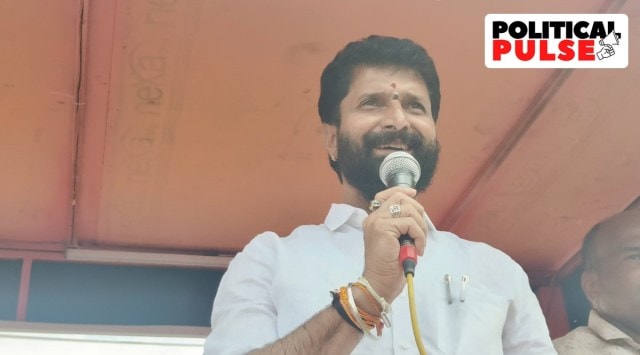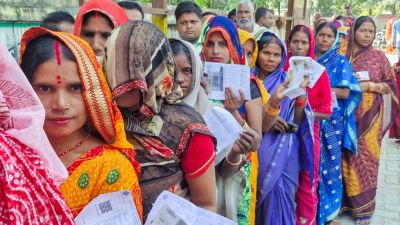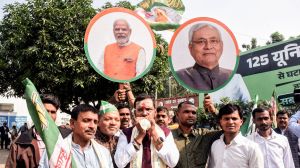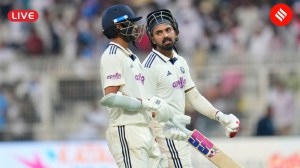Hindutva poster boy, BJP heavyweight CT Ravi defiant in loss: ‘Personal loss and not that of our ideology’
From calling Siddaramaiah “Siddaramullah Khan” to labelling halaal food ‘economic jihad’, the BJP leader is a controversial figure.
 BJP national general secretary C T Ravi was among the party heavyweights who lost in the Karnataka Assembly elections on Saturday. (Facebook: CT Ravi)
BJP national general secretary C T Ravi was among the party heavyweights who lost in the Karnataka Assembly elections on Saturday. (Facebook: CT Ravi) BJP national general secretary C T Ravi was among the party heavyweights who lost in the Karnataka Assembly elections on Saturday. But even in defeat, there was a dash of defiance in Ravi’s concession speech.
“Today’s loss in the Assembly elections is our personal loss and not that of our ideology. We will introspect in the coming days and rectify our mistakes. Our efforts to build a Suvarna Karnataka will continue. I thank Kannadigas for all the support extended to us,” said Ravi, who looking to win his fifth Assembly term from Chikmagalur.
The 55-year-old Ravi is staunchly loyal to the party and the Sangh Parivar and that has been one of the defining features of his political graph. When the BJP government stood on the precipice of a collapse in the southern state in 2010, torn between the factions led by then Chief Minister B S Yediyurappa and a group led by the Reddy brothers of Bellary, just a handful of the party’s 117 MLAs were considered loyal only to the party. Ravi was one of them.
Ravi rose through the BJP ranks in Chikkamagaluru, which lies adjacent to the polarised coastal Karnataka region, as a youth leader in the post-Babri era (in the 1990s). He played a key role in a Hindutva agitation for control of a shrine in the Bababudangiri Hills that is revered by Hindus and Muslims alike, with the Hindu groups lately gaining control.
Ravi became an MLA for the first time in 2004 but was at odds with Yediyurappa. His politics of hardcore Hindutva and communal comments have often been at odds with Yediyurappa, who is a more moderate leader. Once, the BJP leader kicked up a row by referring to former CM Siddaramaiah of the Congress as “Siddaramullah Khan”.
In 2012, he became a minister for the first time during the tenure of the Jagadish Shettar-led government. He was initially allied with the Ananth Kumar group, which also had a big say in the central BJP in the pre-Modi era, and is now considered close to BJP national general secretary (organisation) B L Santhosh who is one of Yediyurappa’s rivals. Shettar had come to power after Yediyurappa left the party over differences with the leadership at the time. Now considered to be close to BJP national general secretary (organisation) and Yediyurappa’s rival B L Santhosh, Ravi’s animosity towards the Lingayat strongman was apparent this time too when he launched a pointed attack. On March 14, Ravi, who is from the Vokkaliga community, suggested that the former CM and his son were no longer dominant forces in the party.
“Just remember one thing. The decision on candidates will not be taken in anyone’s kitchen. Nobody will get a ticket because they are somebody’s son. The decision on tickets will also not be taken at the home of an aspirant,” Ravi said, going on to specifically mention Yediyurappa’s son B Y Vijayaendra. “On the question of Vijayendra, the decision will be taken by the parliamentary board.”
Ravi was among the young leaders the party was considering as Yediyurappa’s replacement after the veteran leader stepped down as CM in 2021. But, eventually, the party went with the safer option of Basavaraj Bommai. In the end, Ravi lost by 5,926 votes to H D Thammaiah, a Yediyurappa-affiliated leader from the Lingayat community who joined the Congress.
Ravi has had his fair share of controversies, with questions being raised, including from within the party, about the rapid increase in his wealth. Last year, when some Hindu rightwing groups gave a call to boycott halal meat, Ravi likened halal food to “economic jihad”.
Though his organisational skills make Ravi a leader who will still likely play a role in the party’s future in Karnataka, his major drawback is that he does not enjoy the support of any caste group, unlike Yediyurappa. After his comments against the Lingayat strongman triggered protests from Lingayat groups, the BJP central leadership reportedly advised him to exercise caution while making statements.


- 01
- 02
- 03
- 04
- 05





























